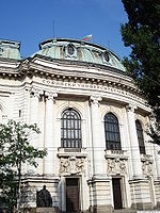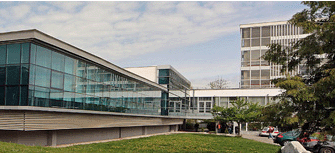
Education in Bulgaria
Encyclopedia

Ministry of Education and Science (Bulgaria)
The Ministry of Education, Youth and Science of Bulgaria is the ministry charged with regulating and promoting the educational and scientific work in the country...
. Full-time education is mandatory for all children aged between 7 and 16. 6-year old children can be enrolled at school at their parents' discretion. Education at state-owned schools is free of charge, except for the higher education schools, colleges and universities. The curriculum of Bulgarian Educational system focuses on eight main subjects: Bulgarian language and Literature, foreign languages, mathematics, information technologies, social sciences and civics, natural sciences and ecology, music and art, physical education and sports. The school year starts on September 15 and ends in May or June depending on the grade level of the students. Classes meet five days a week and usually take two shifts (morning and afternoon). The school year is divided into two terms with Christmas, Easter and Summer holidays. The grading system is based on numerals, where 6 is the highest and 2 is the lowest grade a student can obtain.
In 2003 Bulgaria
Bulgaria
Bulgaria , officially the Republic of Bulgaria , is a parliamentary democracy within a unitary constitutional republic in Southeast Europe. The country borders Romania to the north, Serbia and Macedonia to the west, Greece and Turkey to the south, as well as the Black Sea to the east...
’s literacy rate was estimated at 98.6 percent, with approximately the same rate for both sexes. Bulgaria traditionally has had high educational standards. In the post-communist era, low funding and low teacher morale have damaged the system to some extent, particularly in vocational training. Adherence to classical teaching methods has handicapped development in some technical fields. The current system of primary and secondary education, introduced in 1998, has 12 grades, in which attendance is compulsory from age seven through age 16. In 1998 enrollment in the primary grades was 93 percent of eligible students, and enrollment in the secondary grades was 81 percent of eligible students. The ratio of females to males in primary schools was 0.97, and the ratio in secondary schools was 0.98. Because of Bulgaria’s low birthrate, total primary- and secondary-school enrollment has decreased in the post-communist era, causing reductions in teaching staff and facilities. At the same time, the number of private schools increased by 10 times during the 1990s. Bulgaria’s higher education system was fully reorganized in the mid-1990s. Between 1995 and 2002, the number of university graduates increased from 33,000 to 50,000. In 2002 some 42 institutions of higher learning were in operation, and 215,700 students were enrolled. In 2003 some 4.9 percent of Bulgaria’s national budget was devoted to education.
History of Bulgarian Education
The first schools in BulgariaBulgaria
Bulgaria , officially the Republic of Bulgaria , is a parliamentary democracy within a unitary constitutional republic in Southeast Europe. The country borders Romania to the north, Serbia and Macedonia to the west, Greece and Turkey to the south, as well as the Black Sea to the east...
were opened in the VIII century by the Tzar Boris I and the Tzar Simeon The Great. Two notable Universities were also established in that period at Ohrid and Preslav, with the one in Ohrid having more than 3000 students at one point.
Modern schools began opening in the early nineteenth century(during the National Revival) first for boys and then for girls. Those schools provided only basic education, such as reading, writing, and basic arithmetic. Students who wished to continue their education had to go study abroad. After Bulgaria overturned the Turkish yoke in 1878, it started laying the foundations of its educational system. In 1878 the government passed the Temporary Law on National Schools. This law stimulated the establishment of schools in villages. However, many peasants did not let their children attend school because they thought education was not relevant to peasant life. Furthermore, several universities were established in the period 1878 - 1918. Educational process in Bulgaria was disrupted during the Balkan Wars
Balkan Wars
The Balkan Wars were two conflicts that took place in the Balkans in south-eastern Europe in 1912 and 1913.By the early 20th century, Montenegro, Bulgaria, Greece and Serbia, the countries of the Balkan League, had achieved their independence from the Ottoman Empire, but large parts of their ethnic...
(1912 - 1913) and World War I
World War I
World War I , which was predominantly called the World War or the Great War from its occurrence until 1939, and the First World War or World War I thereafter, was a major war centred in Europe that began on 28 July 1914 and lasted until 11 November 1918...
. By the mid 1920s normal function of schools had been restored.
During the communist era, the Soviet Union
Soviet Union
The Soviet Union , officially the Union of Soviet Socialist Republics , was a constitutionally socialist state that existed in Eurasia between 1922 and 1991....
had a great impact on Bulgarian educational system. A new form of education was brought in. Emphasis on liberal arts was replaced by increased technical training. In 1979 Zhivkov created the Unified Secondary Polytechnical School, which was a twelve-grade program focusing mainly on technical subjects. After the end of the Zhivkov Era, the Bulgarian educational system was completely reconstructed. The government sought to depolitisize the system and take the opinions of others into consideration.
Pre-Primary Education
Pre-primary education embraces children between 3 and 6/7 years old. Optional kindergartenKindergarten
A kindergarten is a preschool educational institution for children. The term was created by Friedrich Fröbel for the play and activity institute that he created in 1837 in Bad Blankenburg as a social experience for children for their transition from home to school...
education is provided for children between three and six years old. However, prior to starting school, children must attend a one-year pre-school program.
Elementary Education
Elementary education (grades 1 - 8) includes primary school (grades 1 - 4) and junior high school (grades 5 - 8). Certificate for Primary Education and Certificate for Elementary Education are obtained upon successful completion of grade 4 and 8 respectively. High schools use grades from the Certificate for Elementary Education as a major admissions criterion.Secondary Education
Secondary education comprises comprehensive high schools and vocational school. The admission to comprehensive schools is based upon grades from entry exams in Bulgarian and/or mathematics as well as grades in junior high school. Students can enroll in high school after the successful completion of grades 7 or 8. Usually, those who want to study languages, mathematics, or informatics in-depth apply to high school in 7th grade. Students graduating from high-school must take high school exit exams in Bulgarian and another subject of their choice.Higher Education
The types of higher education institutions are Universities, Colleges and Specialized Higher Schools. Universities, as in most countries worldwide, have three stages: Bachelor's (undergraduate), Master's (graduate), and Doctoral degrees. Undergraduate stage lasts for at least four years and graduate stage lasts for five years after completion of secondary education or one year after obtaining a Bachelor’s Degree. The third stage of higher education results in obtaining a Ph.D. Degree. Specialized higher schools offer degrees in one or more areas of science, arts, sports, and defense. Usually, the names of these institutions indicate the area of specialization. Colleges are former semi-higher institutes. Some of them are part of universities and use their equipment and facilities.Some universities in Bulgaria are Sofia University
Sofia University
The St. Clement of Ohrid University of Sofia or Sofia University is the oldest higher education institution in Bulgaria, founded on 1 October 1888...
, University of National and World Economy
University of National and World Economy
The University of National and World Economy is a university located in Sofia, Bulgaria.- History :University of National and World Economy is one of the biggest and oldest higher educational institutions of economics in the Republic of Bulgaria and South Eastern Europe with a history of almost...
, University of Economics - Varna, New Bulgarian University
New Bulgarian University
New Bulgarian University is a private university based in Sofia, the capital of Bulgaria. NBU is the first private university in Bulgaria, and among the top rated by Bulgarian businesses universities in the country...
, Plovdiv University
Plovdiv University
The Plovdiv University "Paisiy Hilendarski" is a university located in Plovdiv, Bulgaria. It was founded in 1962 and has nine faculties.- History and Profile :...
, Technical University of Sofia
Technical University of Sofia
The Technical University of Sofia , based in Sofia, is the largest technical university in Bulgaria.Founded on 15 October 1945 as part of the Higher Technical School , it is an independent institution since 1953, when the Polytechnic was divided into four separate technical institutes...
, and South-West University "Neofit Rilski".

